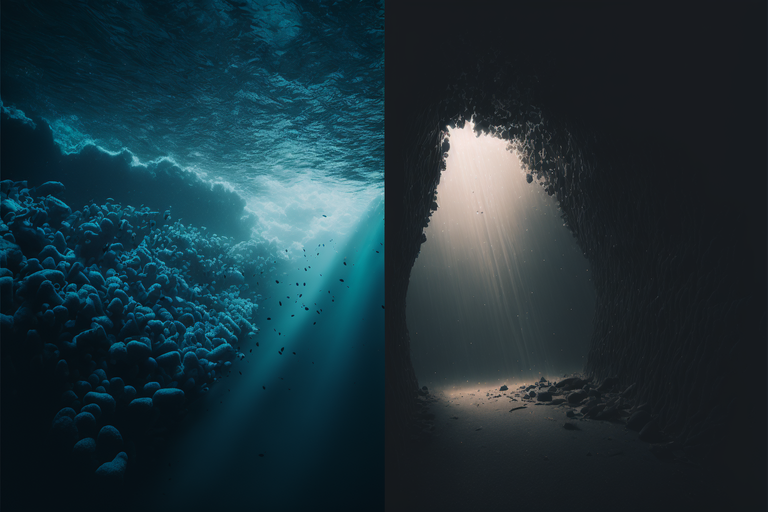We Captured Strange Sounds in the Deepest Parts of the Ocean!?
 Generated by Midjourney
Generated by MidjourneyThe ocean is a vast and mysterious place, full of secrets and hidden depths. While we have made great strides in understanding the oceans and the creatures that inhabit them, there is still much that we have yet to learn. In fact, despite covering over 70% of the Earth's surface, the oceans remain largely unexplored and unknown. To be more exact, we explored and mapped out just around 5% of that prevailing liquid mass on our planet. But why is that?
One reason for this is the inherent difficulty of exploring the ocean. The ocean is a harsh and unforgiving environment, with crushing pressures, total darkness, and extreme temperatures. It is also vast, covering millions of square miles and reaching depths of almost 7 miles at the Mariana Trench, the deepest point on Earth. In comparison, fewer people have been to the bottom of the Mariana Trench than have been to the Moon.
Exploring the ocean is also expensive and logistically challenging. Unlike space, where we can send satellites and probes to gather data and send it back to Earth, exploring the ocean requires sending people and equipment directly into the environment. This requires specialized technologies and training, as well as the development of underwater habitats and vehicles.
Despite these challenges, we continue to explore and learn more about this fascinating and mysterious world, we may yet uncover more of the secrets that lie hidden in the depths of the ocean.
There are countless mysteries hidden by the ocean, and among these mysteries is a series of strange and unexplained sounds that have been recorded by scientists over the years.

History of Recordings
Upsweep
First on the list is the Upsweep, a long, low frequency sound that has been recorded several times by hydrophones in the Pacific Ocean. It was first detected in 1991, and is characterized by a gradual increase in frequency over time. Despite numerous attempts to identify the source of this sound, it remains a mystery to this day. Some speculate that it could be caused by underwater volcanic activity, while others believe it could be the song of an as-yet-undiscovered species of marine life.
Whistle
Next, there is the Whistle, a high-pitched, narrowband sound that was recorded near the equator in the Pacific Ocean. This sound, which was first detected in 1999, is unusual in that it has a very specific frequency range, leading some scientists to believe that it could be the result of some kind of communication or signaling behavior by marine life. However, the exact source of the Whistle remains a mystery, and more research is needed to determine the true cause of this sound.
Bloop
Perhaps the most famous of these mysterious ocean sounds is the Bloop, a loud, low-frequency sound that was recorded in 1997 in the South Pacific Ocean. It is one of the loudest sounds ever recorded in the ocean, and its source remains a mystery to this day. Some have speculated that it could be the result of underwater volcanic activity, while others believe it could be caused by some kind of giant sea creatures like Blue Whales, or Giant Squids. However, again, the exact source of the sound remains unknown.
Julia
Julia is a series of sounds that were recorded in the Pacific Ocean near the equator in 1999. These sounds are characterized by rapidly changing frequencies, and their source remains unknown. Some scientists believe that Julia could be the result of some kind of communication or signaling behavior by marine life, while others think it could be caused by underwater volcanic activity or other geological processes.
Slow Down
The Slow Down is a sound that was recorded in the South Pacific Ocean in 2001. It is characterized by a slow decrease in frequency over a period of several minutes, and the source of this sound is also unknown. Some theories about the Slow Down suggest that it could be caused by the movement of large underwater structures (maybe Antarctica's glaciers) or the migration of large groups of marine life, but without further data, it is difficult to say for sure.
Train
The Sound Train is a mysterious sound that was first recorded in the Pacific Ocean in 2016. It is characterized by a series of short, sharp bursts of sound that repeat at regular intervals, similar to the sound of a train. The source of the Sound Train is unknown, and there are several theories about what could be causing it, including underwater volcanic activity and marine life. However, more research is needed to determine the true cause of this mysterious sound.

We can only speculate about the source of these sounds, as the explanations provided are uninteresting and similar. At present, the most plausible explanations seem to be some of these. However, we might even entertain the notion of secret underwater military operations, although the cost of such operations would be high, but for what purpose? To defend against hidden underwater aquatic civilizations? This suggestion is as good as any at the moment.
As we continue to probe the mysteries of the ocean, it is likely that we will encounter more inexplicable phenomena. What other secrets does the sea conceal, and what new mysteries will we uncover as we delve further into its depths? Only time will tell. So, what do you believe these sounds could be? Could they be the attempts of some unknown marine species to communicate with us, or is it something even more mysterious and beyond comprehension?
 Created by Pixexid
Created by PixexidWhat can be said with certainty is that for some of you, this post has only served to intensify your fear of the sea. Thalassophobia, a term for one of humanity's most common fears, is the fear of the ocean and all that it represents - including the dark and deep waters that hide the unknown. Swimming in such seas and oceans is an act that few can stomach. Most prefer to keep their feet firmly planted on solid ground, feeling discomfort at the thought of venturing into such depths. And yet, it is in these dark depths that the secrets of the ocean lie, secrets that we have yet to uncover. Swimming above the Mariana Trench is a feat that allows us to figuratively float seven miles above the ocean floor, in the face of these deep and mysterious waters. Few can remain indifferent to such endeavors, for our oceans surely harbor secrets beyond our comprehension. Until we are able to uncover these mysteries, we can only stand in awe at the vastness of the sea.

Thank you for reading! Thank you for reading! If you like themes like #science, #nature, #philosophy, #mystery, #gaming, and similar topics feel free to Follow me for more content like this. Also, if you have any suggestions to make these posts better or just want to hang out, please leave a comment so we can chat.
Sources:
Congratulations @awesomeintrigue! You have completed the following achievement on the Hive blockchain And have been rewarded with New badge(s)
Your next target is to reach 50 comments.
You can view your badges on your board and compare yourself to others in the Ranking
If you no longer want to receive notifications, reply to this comment with the word
STOPTo support your work, I also upvoted your post!
Check out our last posts:
Support the HiveBuzz project. Vote for our proposal!
Technology has been trying a lot and we keep getting closer to what it's all about but then just like you stated in your post, it comes with challenges
It's "easier" to explore the satellite than the ocean but I believe that one day, the scientists will still provide us with sufficient information on the subject matter
Great post
For now, it is easier and most importantly, a lot cheaper. Exploring underwater has the problem of dealing with... well, all that water haha. While space has pretty much no obstructions, after you leave the atmosphere, 90% of the job is already done.
Exactly
Well, we keep getting closer everyday... Thanks for the great scientists we have
Hi, friend @awesomeintrigue
I really liked your post.
I love movies and programs that show underwater life, of which we don't know much, due, as you explain, to the vastness of the area and multiplicity of extreme environments for human beings.
However, I prefer to watch it on screen, as I am afraid of the depths hehe.
Excellent work.
A Hug
Thanks!
Yeah, I feel that. I totally prefer watching it on screen too! I get so afraid, I remember that one time (and the last time haha) I was on a glass boat, and my anxiety went through the roof for just looking down into that abyss, even though I was not in the water. Although technically I was on the boat... but you know what I mean. haha